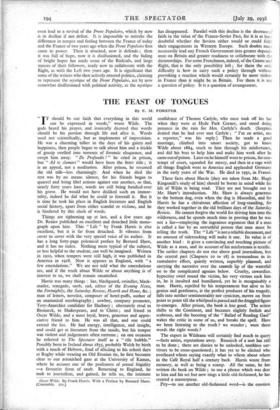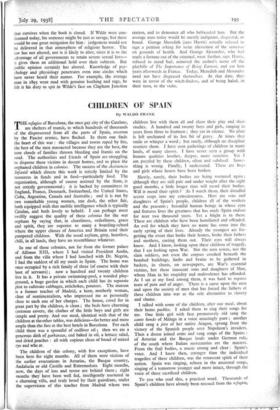THE FEAST OF TONGUES
By E. M.
FORSTER
" TT should be our faith that everything in this world .1. can be expressed in words," wrote Wilde. The gods heard his prayer, and ironically decreed that words should be his portion through life and after it. Words used not scientifically, but as implements of imprecision. He was a charming talker in the days of his gaiety and happiness, then people began to talk about him and a trickle of gossip swelled into torrents of forensic eloquence, and swept him away. " De Profundis ! " he cried in prison, but " Ad to clamavi " would have been the fitter title ; it is an appeal, not a meditation. After prison, he resumed the old talk—less charmingly. And when he died the rest was by no means silence, for his friends began to quarrel and bring libel actions against one another, so that, nearly forty years later, words are still being bandied over his grave. He would not have disliked such an immor- tality, indeed he did what he could to forestall it. But it is time he took his place in English literature and English social history, apart from either scandal or reclame, and he is hindered by this slush of words.
Things are tightening up at last, and a few years ago Dr. Reiner published an excellent and detached little mono- graph upon him. This " Life " by Frank Harris is also excellent, but it is far from detached. It vibrates from cover to cover with the very special voice of its author. It has a long forty-page polemical preface by Bernard Shaw, and it has no index. Nothing more typical of the subject, or less helpful to the student, can well be imagined. Written in 1910, when tempers were still high, it was published in America in 1918. Now it appears in England, with " a few emendations." We are not told what the emendations are, and if the truth about Wilde or about anything is of interest to us, we shall remain unsatisfied.
Harris was many things : liar, blackguard, swindler, black- mailer, renegade, snob, cad, editor of the Evening News, the Fortnightly, the Saturday Review, Hearth and Home, &c. ; man of letters, novelist, composer of hotel-puffs, author of an anatomical autobiography ; cowboy, company promoter, Tory-Anarchist candidate for Hackney ; alternately rival to Bismarck, to Shakespeare, and to Christ ; and friend to Oscar Wilde, and a most loyal, brave, generous and appre- ciative friend to him. He was all that, and one could extend the list. He had energy, intelligence, and insight, and could get at literature from the inside, but his temper was violent and judgements often extreme ; on one occasion he referred to The Spectator itself as a " vile bubble." Possibly born in Ireland about 1855, probably Welsh by birth with a touch of Hebrew, fond of alluding to his school days at Rugby while wearing an Old Etonian tie, he first becomes clear to our astonished gaze at the University of Kansas, where he accuses one of the professors of ,sexual frigidity —a favourite form of snub. Returning to England, he took to journalism, and gained, he tells us, the intimate
Oscar Wilde. By Frank Harris. With a Preface by Bernard Shaw. (Constable. los) confidence of Thomas Carlyle, who once took off his hat when they were at Hyde Park Corner, and stood doing penance in the rain for Mrs. Carlyle's death. (Sceptics denied that he had ever met Carlyle ; " I'm an artist, not a reporter," was his reply.) Then he made a good marriage, climbed into smart society, got to know Wilde about 1884, stuck to him through his misfortunes, and did his best to help him and make him work after he came out ofprison. Later on he himself went to prison, for con- tempt of court, squealed for mercy, and then in a rage with all things English went to America and applauded Germany in the early years of the War. He died in 1931, in France.
These facts about Harris (they are taken from Mr. Hugh Kingsmill's study of him) should be borne in mind while his life of Wilde is being read. They are not brought out in Mr. Shaw's introduction. Mr. Shaw is always generous to the bottom dog, even when the dog is Mussolini, and for Harris he has a chivalrous affection of long-standing, for they worked together in the old brilliant days of the Saturday Review. He cannot forgive the world for driving him into the wilderness, and he spends much time in proving that he was not a liar—employing the ingenious argument that if a man is called a liar by an untruthful person that man must be telling the truth. The " Life " is not a reliable document, and no amount of sidetracking will make it one. Its value is of another kind : it gives a convincing and touching picture of Wilde as a man, and its account of his misfortunes is terrific. The earlier chapters do not rise above good journalism, but the central part (Chapters to to 18) is tremendous in its cumulative effect, quietly written, superbly planned, and carrying the narrative over the smooth lip of the waterfall on to the complicated agonies below. Cruelty, cowardice, hypocrisy swirl round the victim, his very virtues suck him in, he is insulted and humiliated, yet he is recognisably a man. Harris, repelled by his temperament but alive to his genius and gentleness, is the perfect producer of his tragedy, falls into neither sentimentality nor cynicism, moves on from point to point till the whirlpool is passed and the draggled figure re-emerges. After prison, the book is less good. The action shifts to the Continent, and becomes slightly foolish and scabrous, and the boosting of the " Ballad of Reading Gaol" wakes the critic in some of us, and breaks the spell. Have we been listening to the truth ? we wonder ; were these words the right words ?
The expert in Wildeana will certainly find much to query —facts amiss, reputations awry. Research of a sort has still to be done ; there are diaries to be unlocked, toothless sur- vivors to be cross-questioned; it has yet to be elicited who overheard whom saying exactly what to whom about whom in the Café Royal half a century back. Harris wrote from memory, as well as being a scamp. All the same, he has written the book on Wilde ; to use a phrase which was dear to him and his set but now rings a little old-fashioned, he has created a masterpiece.
Pity—to use Another old-fashioned word—is -the emotion that survives when the book is closed. If Wilde were con- demned today, his sentence might be just as savage, but there would be one great mitigation for him judgement would not be delivered in that atmosphere of religious 'horror. The law has not altered, nor is it likely to alter, since it is to the advantage of all governments to retain severe sexual laws— it gives them an additional hold over their subjects. But public opinion certainly has altered. Knowledge of psy- chology and physiology penetrates even into circles which have never heard their names. For example, the average man in 1895 went mad with genuine loathing and rage, he felt it his duty to spit in Wilde's face on Clapham Junction station, and to denounce all who befriended him. But the average man today would be merely indignant, disgusted, or bored. George Meredith (says Harris) actually refused to sign a petition asking for some alleviation of the sentence on grounds of health. And George Alexander, who had made a fortune out of the criminal, went further, says Harris, refused to stand bail, removed the author's name off the playbills of The Importance of Being Earnest, and cut him years afterwards in France. Today, Meredith and Alexander need not have disgraced themselves. At that date, they were in terror of the witch-finders, and of being haled, in their turn, to the stake.



































 Previous page
Previous page